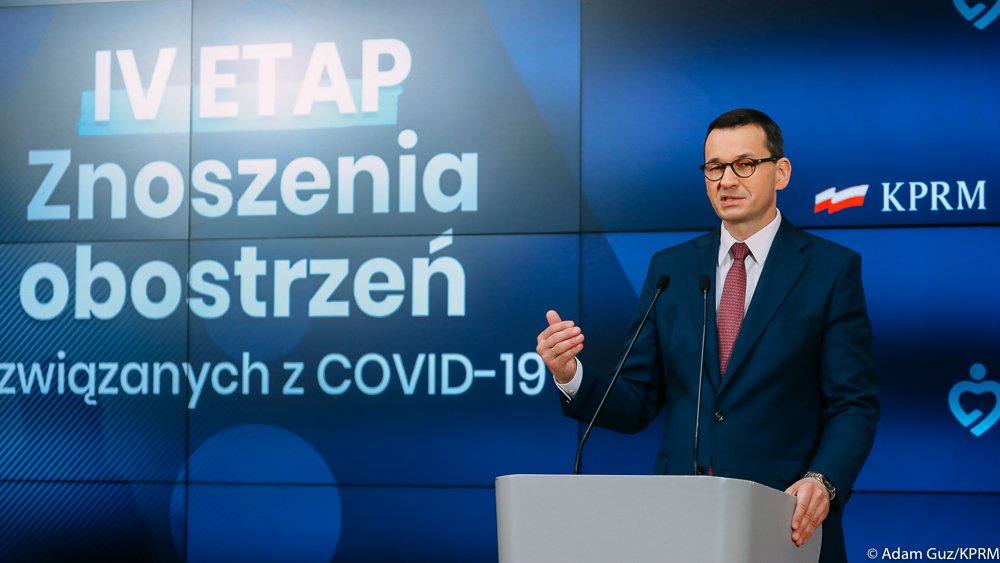Poland’s government has announced the fourth stage of its “unfreezing” of lockdown measures, including loosening face-covering requirements, allowing mass gatherings to take place, and reopening gyms, cinemas and theatres.
Two weeks ago, as Poland entered the third stage, restaurants, cafes, sports facilities and hair and beauty salons were allowed to reopen. Now, under the latest measures:
- From 30 May: face covering is no longer mandatory in outdoor spaces where one can maintain distancing of two metres from others. In other situations – for example, on crowded pavements or in shops, public transport, churches and cinemas – covering the mouth and nose remains compulsory.
- From 30 May: limits on the number of people who can be present at one time in shops, food and drink outlets, and churches will no longer apply. However, social-distancing and face-covering rules must still be respected, though masks can be removed when sitting at tables.
- From 30 May: public gatherings of up to 150 people (such as outdoor concerts) may be held. Participants will still have to maintain rules on social distancing, meaning either remaining two metres apart or covering their faces. Decisions on whether to permit specific gatherings will be made individually based on the current epidemiological status.
- From 6 June: cultural institutions, cinemas, theatres and recreational facilities such as gyms and swimming pools can reopen, though with reduced numbers allowed to attend and under the obligation to meet sanitary requirements. Discos are excluded and will not reopen yet.
- From 6 June: weddings and family events of up to 150 people can take place
Border restrictions, including an entry ban on non-resident foreigners, remain in place and international flights are suspended until at least 6 June. Domestic connections are expected to resume from the beginning of next week.
Announcing the new rules, the prime minister, Mateusz Morawiecki, warned that the public should “still be vigilant, avoid crowds, and maintain social distance”.
“A new reality is ahead of us, which we need to learn to live in,” said Morawiecki. “I hope that with proper discipline we will be able to quickly return to economic normality. Let’s stick to the rules; this fight is still continuing.”
The prime minister also suggested that it was thanks to his government’s effective response to the epidemic that the loosening of restrictions has been possible.
Poland introduced some of the earliest and toughest lockdown measures, and has had a low rate of infections and deaths by international standards. The overall number of deaths in Poland this year has been lower than in recent times.
“The data show that we have controlled the pandemic in a much more efficient way than the richest countries in the world,” said the prime minister. He presented data showing that Poland has had 27 coronavirus deaths per million inhabitants compared to much higher numbers in most European Union member states.
Liczba zgonów spowodowanych #koronawirus ⤵️ pic.twitter.com/7R4o2fMqj4
— Kancelaria Premiera (@PremierRP) May 27, 2020
Poland, however, remains an exception in the EU in that the number of active cases of the virus is still increasing, whereas they are in retreat elsewhere.
This is because Poland has followed a different model from other countries, the health minister, Łukasz Szumowski, has said. Its lockdown measures effectively contained the spread of the virus but pushed the peak of infections forward.
Speaking today, Morawiecki said that his government’s aim was “to shift the wave of infections so that there was not a shortage of respirators and [hospital] beds”. This has been a success, said Szumowski, noting that 80% of emergency beds for coronavirus cases and 90% of respirators are currently unused.
The prime minister also noted that the government has stepped up coronavirus testing, and “that is why we can move on to the fourth stage of lifting restrictions”. An average of around 20,000 tests are now carried out per day. There has been large-scale screening in the Silesia Province, which is where the majority of infections are now reported.
Main image credit: Adam Guz/KPRM/Twitter

Daniel Tilles is editor-in-chief of Notes from Poland. He has written on Polish affairs for a wide range of publications, including Foreign Policy, POLITICO Europe, EUobserver and Dziennik Gazeta Prawna.




















